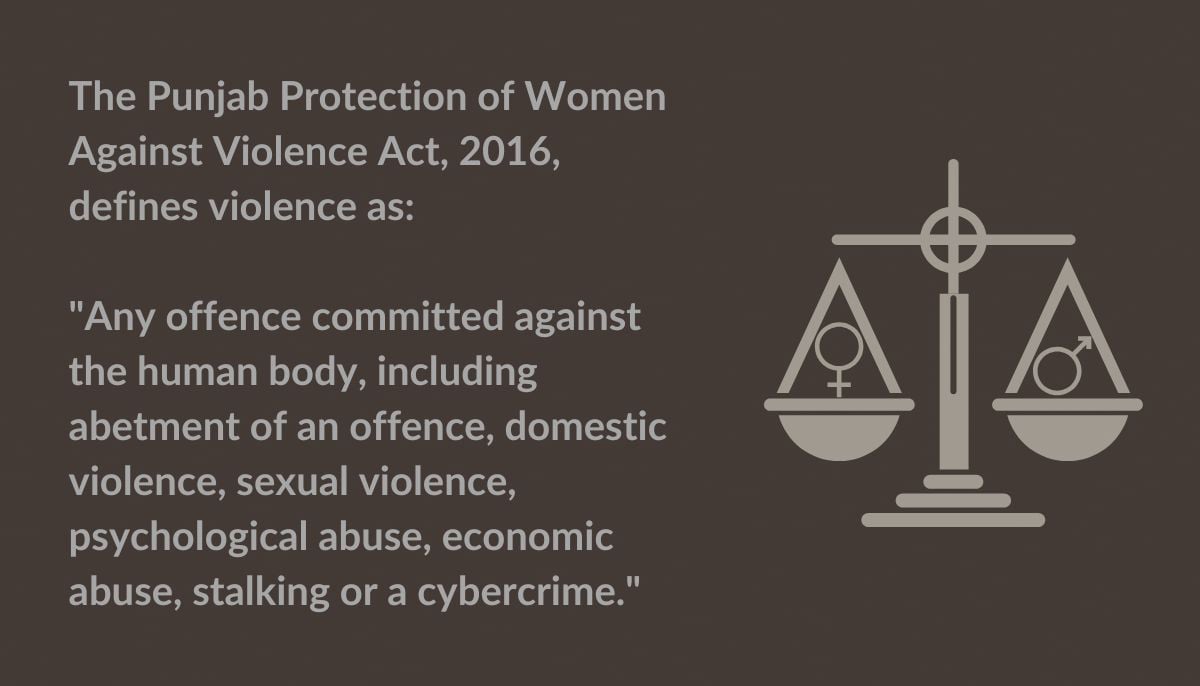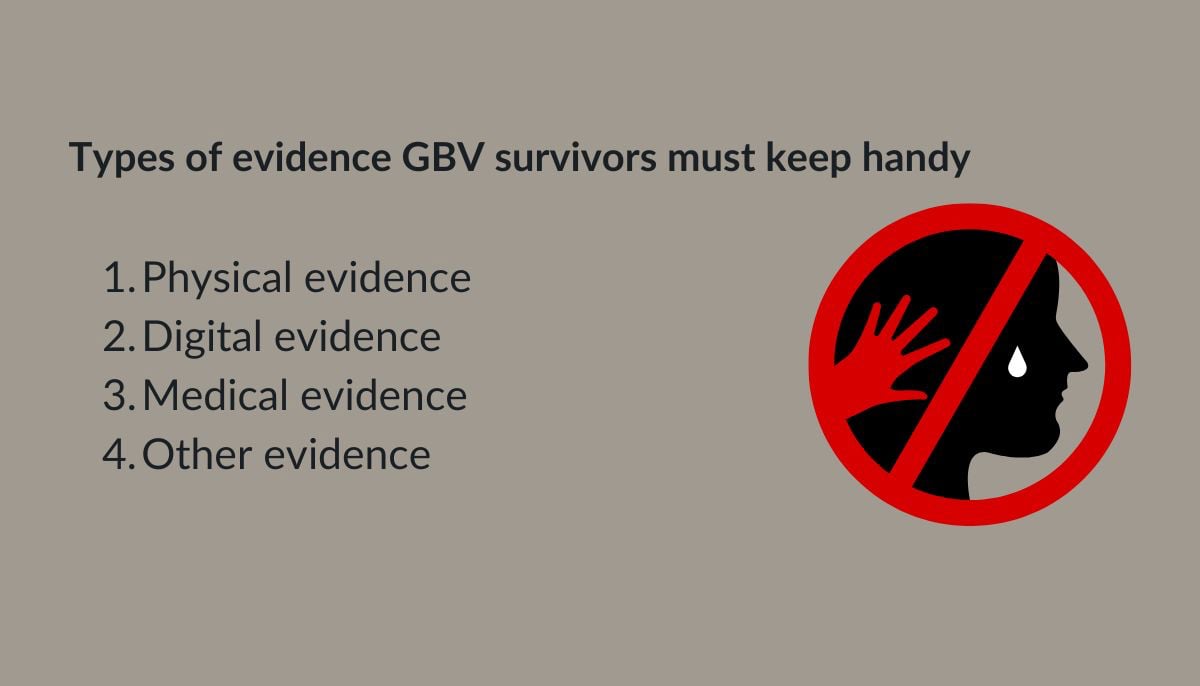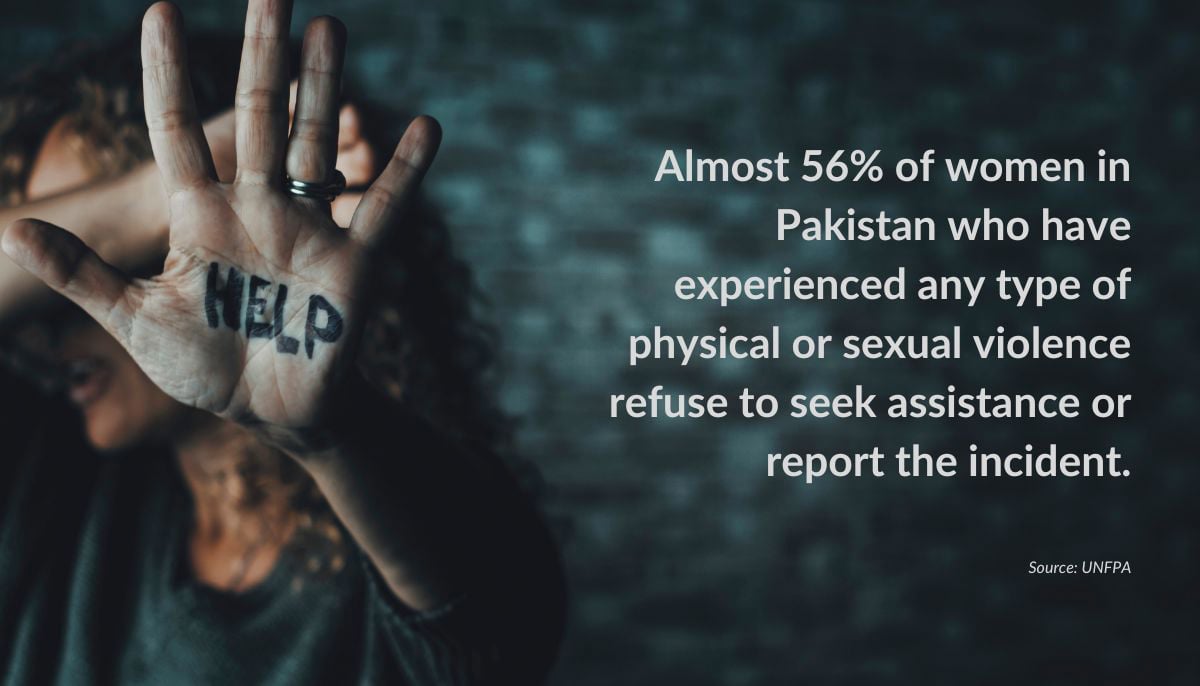Pakistan ranks near the bottom of the Global Gender Gap Index, with only Sudan ranking lower. Despite the concerning statistics, Pakistan continues to legislate and hold the state accountable for its inaction when it comes to violence and women, violence at homes, workplaces, online spaces, in public spaces and others.
Gender-Based Violence (GBV) is a pervasive issue worldwide, and Pakistan is no exception. The United Nations Convention on the Elimination of All Forms of Discrimination against Women (CEDAW), defines Violence Against Women (VAW) as “any act of gender-based violence that results in, or is likely to result in, physical, sexual or psychological harm or suffering to women…”.
Pakistan’s commitment to international conventions like CEDAW has led to the development of several laws and policies, one such attempt, the Punjab Protection of Women Against Violence Act, 2016, defines violence as: “Any offence committed against the human body, including abetment of an offence, domestic violence, sexual violence, psychological abuse, economic abuse, stalking or a cybercrime.”
These laws, along with many others, comprehensively cover aspects of violence which may even be absent in international guidelines. However, this raises the question of whether over-legislation is really the answer to our problems. Despite having pro-women laws and amendments to the penal code, their effectiveness is often questioned.
This article explores the complexities of GBV in Pakistan, examining the existing laws, challenges in implementation, and what survivors can expect when seeking justice.
What to do when faced with GBV?
Taking action against GBV can be intimidating, but necessary. As a practitioner who frequently comes across GBV cases, we see GBV instances arising in our safe homes in the garb of domestic violence, at workplaces with strict codes of conduct as workplace harassment and in the borderless and infinite world of the internet as cyber harassment. Although action against GBV may vary, from confiding in a trusted friend to lodging an official complaint, what eventually matters is how we document violence and prevent recurrence.
It is particularly important to note that if the survivor of GBV, seeking to lodge an official complaint is a minor (below the age of 18), they will need to be accompanied by a guardian when reporting the incident.
Government helplines and support services
There are several state-level initiatives that attempt to address GBV at the grassroots level, such as Punjab’s Helpline 1043 or Balochistan’s Women Helpline 1089. In addition to these helplines, the state has also set up dar-ul-amans (shelter homes), online services such as the Sindh’s Online Women and Child Protection Cell, virtual women police stations and others. These support services attempt to provide direct support to the violence-stricken women. However, despite the formation of these crisis cells, their efficiency continues to pose a question for the system, highlighting flaws and the non-sustainable vision for such initiatives.
For instance, if a survivor of GBV eventually decides to file their complaint, it is important for them to follow the procedure, as already mentioned, the success rate in GBV cases is directly related to how one documented the evidence and the relevant events. Nevertheless, as we actively advise, time is of great essence in GBV cases and others. Survivors should immediately reach out to the emergency helpline at 15. However, if unable to make a direct call, they must approach their local police station (thana), submit a written complaint at the Helpdesk, receive an electronic or otherwise a receipt of the complaint, and request assistance to a government-affiliated hospital for medical inspection.

Following this process establishes a legal trail and secures a valid Medico Legal Certificate (MLC), which later serves as tangible evidence during the investigation and in court. It is essential for one to follow these steps as they can significantly influence the outcome of the case in the long run.
This leads us to the importance of evidence and witnesses in legal cases. Instances of GBV often lack physical evidence, especially in cases of verbal and psychological harassment. Additionally, perpetrators often wait for the right opportunity and ensure that they execute such conduct behind closed doors or in absence of any witnesses.
Fortunately, the law encapsulates the same. For example, the Protection against Harassment of Women at the Workplace Act, 2010, recognising these challenges and the lack of evidence, encourages an aggrieved person, who may have been subjected to workplace harassment, to report any offensive behaviour immediately to someone they trust, even if they do not wish to make a formal complaint at that time. This asserts the importance of evidence and witnesses in a legal matter. To aid in gathering evidence, the following checklist of physical, digital and medical evidence may be helpful:
Physical evidence
1. Torn or damaged clothing is a crucial evidence. The survivor must ensure that they do not change their clothing before filing a complaint especially in case of blood stains, damaged clothing, etc, this may constitute as important evidence.
2. Any object(s) used as weapon against the body of survivor. For example, sticks, knives, acid and other items.
3. Broken personal items suggesting physical violence and/or struggle are valid proof. Please note that this may vary from one instance to another and this may be a non-exhaustive list of items. For example, broken jewellery, glasses, mobile device, torn or damaged documents, among other things.
Digital evidence
1. Text messages, emails, or social media messages from the alleged accused person.
2. Screenshots of online harassment or abuse and information systems used.
3. Emails or messages from witnesses or bystanders.
Medical evidence
1. Medical records (visitation record), including doctor’s notes and test results.
2. Photos of injuries or medical conditions related to the GBV.
3. Prescription, X-rays, MLCs and other medical record related to the GBV.
Other evidence
1. Police reports or incident reports.
2. Court documents, such as restraining orders or protection orders.
3. Records of missed work or school due to the GBV.
4. Bills or receipts for medical expenses, counselling, or other related costs.

What to expect when filing GBV cases?
Sexual harassment is no more seen as physical assault only. Instead, state law now holds one accountable for “using words, sounds, gestures, or objects to insult a woman’s modesty” as per section 509 of the Pakistan Penal Code, 1860. Similarly, the Supreme Court of Pakistan also holds that “gender-bias” in the workplace constitutes sexual harassment. The country has also enacted progressive laws, such as The Transgender Persons (Protection of Rights) Act, 2018. However, despite these advancements, law enforcement agencies often dismiss GBV cases as domestic matters or trivial issues that need to be resolved privately within the family.
Alarmingly, in a country with extensive legislation, most GBV cases go unreported, and many reported cases remain unregistered by the relevant agencies. According to United Nations Population Fund (UNFPA) Pakistan, almost 56% of women in Pakistan who have experienced any type of physical or sexual violence refuse to seek assistance or report the incident.

Despite these challenges, survivors who launch official complaints may face additional obstacles. For instance, delays in filing complaints can lead to dismissal by law enforcement agencies. Although there are set precedents and the Supreme Court of Pakistan acknowledged this challenge in 2022, stating that “delay in lodging complaints for incidents of harassment is understandable” due to societal pressures and cultural norms. While courts are encouraged to take a lenient view on delays and decide cases on merit, law enforcement agencies including local police stations, ombudspersons, crisis cells or Helplines, often dismiss cases due to delays and/or other related issues that weakens the survivor’s claim. This highlights the plight of the system and the reality of its practical implementation.
It may be true that the state promises to grant non-bailable warrants against perpetrators found guilty for “using verbal or written communication to annoy, intimidate..” or against an individual who is attacking a woman’s modesty by intruding on her privacy. However, the actualisation of these protections continues to be an exception instead of being the norm. It is crucial that the survivors are well versed with these protections and when they reach the local authorities, they are aware of their basic rights.
By educating ourselves about the laws and taking meaningful action, we can move closer to actualising access to justice in its true sense. It is necessary to inculcate this awareness at the community level, especially amongst women about these laws and their protections. Only then can we truly hope to combat and eventually prevent GBV within our society.
Irum Shujah (Advocate High Court) is a practicing lawyer with a focus on litigation for survivors of GBV, TFGBV, and other vulnerable groups.
Header and thumbnail image via Canva

